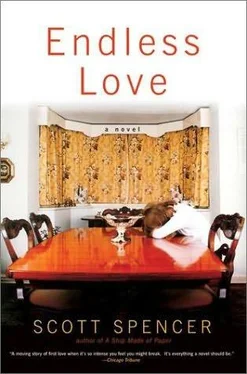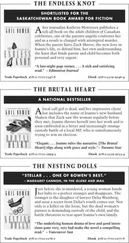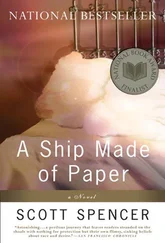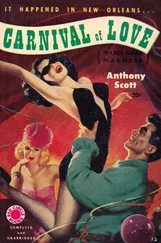“No. You can’t make it mine. It can’t be what I want to do. It has to be mutual, you know.”
“It is. I’d love to be that baby growing inside you. It would be better than being married.”
“It seems like the next step. We can fuck until we die but after a while it starts wearing thin, doesn’t it?”
“Not for me.”
“I don’t mean yet. But it will. And I don’t really know how I feel about childless couples. It seems like cheating.”
“I could have nothing ever change again and I’d have a better life than I deserve.”
“I think it’s the normality of the whole thing that excites me,” said Jade. “How simple and perfect and matter of fact. All I have to do is not put in my diaphragm and then we can do what we normally do and then just as simply as that the whole world is different. It really is exciting to me, David. It’s like thinking about screwing for the first time, when all I had to go on was hearsay, one dirty picture, and my imagination.”
As Ann would say, how the souls of the unborn hovered over us that night. Jade came to bed, her uterus unshielded, and we made love with a gravity and wholeness that exceeded anything we had ever known. It was what making love for the first time would be if we were born with sexual skills, yet even that doesn’t faithfully describe the power of making love without contraception. We were playing long plaintive tunes on our bodies, trying to coax a human life out of the vast invisible jumble of chemistry and fate. A whole new vocabulary of instinct; my ejaculation seemed to hurtle itself deeper into Jade than ever before. The universe based on risk and effort. Sex no longer lifted us up and outside of time, but sent us streaming back and forth, into our own beginnings and toward the shrouded marker of someone’s future.
“Again,” said Jade after we came. “I feel like a dog. Never so out of control…”
It wasn’t pleasure, it was destiny. We stared at each other as we made love and barely made a sound. Lovers used to believe that their souls rushed out of them when they made love and we did hold on to each other as if we were endangered. I don’t know how many times we started from the beginning again, but we went on for hours that night. It was the energy, the obsession of our first month together, in Chicago, when Jade went through the days with lilac bruises on her spine and I’d be having dizzy spells. We petitioned the universe to make us a family, but it didn’t work out. The next day we both felt we had acted more impulsively than we could sustain and we went back to using birth control. We waited the rest of the month to see if our one try at conception had taken. I was certain it had, but I was wrong. Ten days later, Jade got those pains in her lower back that herald her period. “I’m glad,” she said. “We have too much to decide to have a baby now. You’ve got to straighten things out with the cops. My family doesn’t even know we’re together. I need to graduate and figure out my life. And so do you. You won’t be selling pants all your life, I hope.”
When her period finally began, we were having lunch on the lawn of the Presbyterian church near my work. “I have to get to a john,” said Jade, putting down her egg salad sandwich. We looked at each other and shrugged. I got up, took Jade’s hand, and pulled her up. We put our arms around each other. “I wasn’t sure,” Jade whispered. I didn’t know if she meant she wasn’t sure if she was going to actually have her period or if she wasn’t sure about having a baby. I didn’t ask. I wanted that baby without exactly knowing why. My desire for it couldn’t refute all of the objections, yet the objections couldn’t diminish the desire. I didn’t know what to say. My heart was racing at twice its normal rate and I just held her.
August 12, 1973, was the sixth anniversary of the fire; every year on that day the Butterfields gathered at one or another of their homes. This year, they were expected at Keith’s house in Bellows Falls—just ninety miles away. Up until the twelfth, Jade was decided not to go. She’d yet to stop concealing from Ann, Sammy, and Keith that she and I were together again—though I was certain that Ann somehow knew—and the anniversary of the fire seemed like the worst possible occasion to tell that particular truth. Yet on the other hand she didn’t want to spend a whole day with what was left of her family in such a false position.
“I hate going to Keith’s house,” she said. “I hate that he lives so close. I hate the jobs he works to keep the place going. I hate all the photographs and little scraps of family memories. He must think we’re the Romanovs. And I hate the place as much as he does. He makes you go on a tour each time so he can point out all the little things wrong with his house. The bricks crumbling around the fireplace, the wet spots in the wall, the rotting floorboards. I mean the guy is living in a house built in 1825 and we’re supposed to be upset that it’s not in perfect shape.”
On the morning of the twelfth I woke to the clock radio and Jade was throwing a change of clothes into her black nylon travel bag. “I’ll probably be back tonight but you never can tell with my family,” she said. It made me late for work but I went with her to the bus station. We were both nervous. Our first separation since spring. The bus was headed toward Boston but it was completely empty. The driver was tall and silver-haired. He looked like an airline pilot and I wondered if some deep character flaw forced him to drive a bus instead. Jade stopped on the bottom step of the bus and hugged my head to her breasts. “I don’t know what I’ll do if they start talking about you,” she said. “It makes me want to murder. I’ll tell them right away that we’re together and they can make anything they want to out of it.”
Gertrude was empty when I got home from work. Colleen had taken Oliver to Fishkill, ostensibly so Oliver could be a carpenter for Colleen’s mother, who was converting an old garage house into a guest apartment. Anemone Grommers was in Greece. Nina Sternberg was in Los Angeles. The others were simply out somewhere. I fed the dogs. In a few days, the puppies would be old enough to leave their mothers and we’d be taking the kennels down. I sat out in the back yard for a while and watched the pups gnaw on each other. I thought of how close they had brought Jade and me to starting our own family. It seemed truly lunatic to be influenced like that but I embraced our susceptibility.
I didn’t realize it first off, but every thought I had was a part of a well-constructed unconscious argument in favor of my calling home. A couple of days after moving to Stoughton I’d sent Rose and Arthur short notes, telling them I was all right. I’d given both letters to Miriam Kay to mail for me, as she was on her way to visit her sister in Toronto and I didn’t want a revealing postmark to give me away. Being outside the law bloats your self-importance and I sat for some time in the kitchen with my hand on the telephone, wondering if my call home would somehow be traced: like the hero of sentimental gangster story, I risked detection—death!—in order to get through to Mama. But finally the laws of civilization worked their way on me. Just as nature endows us with desire so that even the misogynist will reproduce, we bless ourselves with a sense of guilt so that even the heedless will sometimes do the correct, difficult thing. I dialed the Ellis Avenue number and Rose picked up on the fifth ring. She must have been taking a late afternoon nap; there was nowhere in the apartment that far from a phone. Her voice was small, meek, like a little girl who’s been warned not to answer the phone.
“It’s me,” I said.
She was silent and the silence continued. The beginning of a word. And then she slammed the phone down and broke the connection.
Читать дальше












